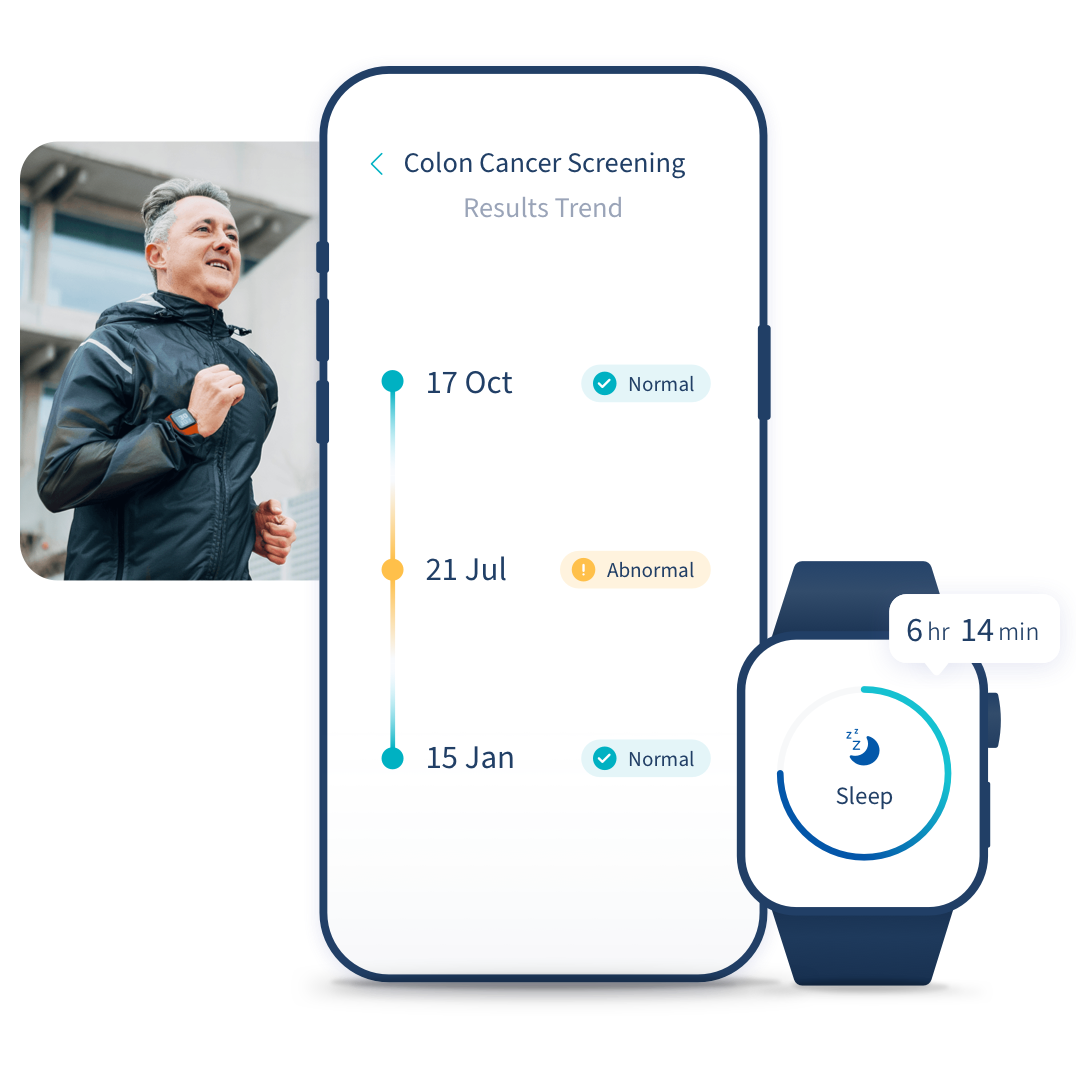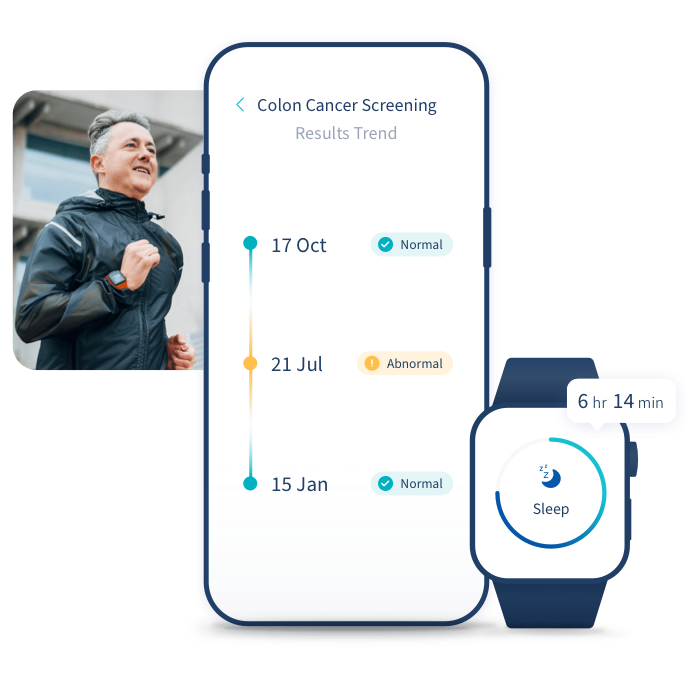Colon Cancer Screening Test (FIT)
Fecal immunochemical test
Easy & non-invasive screening that looks for hidden blood in the stool, which can be a sign of cancerous or precancerous growths in the colon or rectum. If blood is found in your sample, further follow up will be required.
What type of test is this?
Fecal Immunochemical Test (FIT)
Benefits:



Collection Methods
Stool Sample
Please note that this test is only suitable for those aged 45 and above or those who have a family history of colon cancer
FSA & HSA cards accepted.
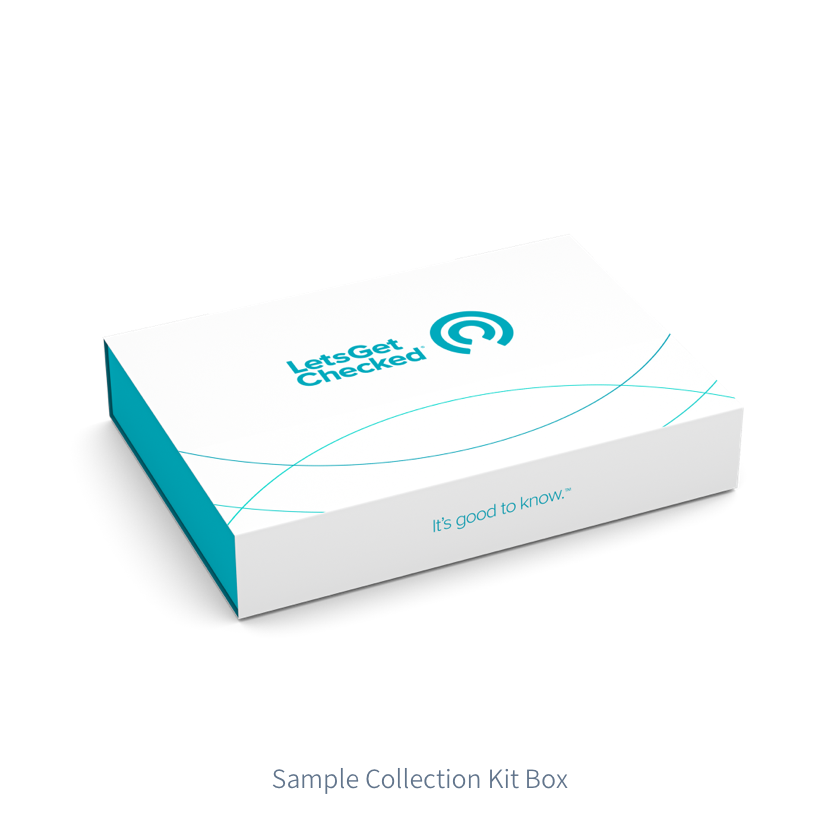
Over 10% of new colorectal cancer cases are in people under 50
Source: Screening for Colorectal Cancer: US Preventive Services Task Force Recommendation Statement. JAMA. 2021;325(19):1965-1977. doi:10.1001/jama.2021.6238

About this test
About this test
Symptoms
Colo-rectal cancer often has no symptoms in the early stages when it's most treatable. This is why early, and regular, colo-rectal cancer screening is so important.
If symptoms do occur, they can include:
Blood visible in the stool
Changes in your bowel habits.
Blood in or on your stool (bowel movement).
Abdominal pain, aches, or cramps that don’t go away.
Unexplained weight loss.
It's important to remember that screening tests are for people who don't have any symptoms to help diagnose conditions at an earlier stage. If you have already noticed blood in your stool, or any other symptoms, this screening test is not suitable and you should talk to your healthcare provider as soon as possible. Other tests such as a colonoscopy may be required.
There is a possibility that this screening test may not detect blood in the stool of someone who has cancer, which is called a false negative. It is very important to talk to your doctor if you have any symptoms or concerns, even if your test results are normal.
How FIT testing works
The fecal immunochemical test (FIT) detects microscopic blood in the stool, meaning blood that's invisible to the naked eye.
This test cannot diagnose cancer - it is a screening test, which means it can help identify when there is a problem (i.e. bleeding) in the colon or rectum that needs to be followed up with your healthcare provider.
There are many reasons why blood may be present in the stool, including hemorrhoids, inflammatory bowel disease (such as Crohn's disease and ulcerative colitis), stomach ulcers and polyps (non-cancerous growths). However, there may be other causes of blood in the stool, including precancerous polyps and colorectal cancer. The next step is usually a colonoscopy, which involves a specialist physician examining the inside of your colon and rectum, allowing them to take samples (biopsies) of any abnormal areas.
The LetsGetChecked FIT is a great first step in your colorectal cancer screening journey if you want to take action now and start those conversations on protecting your health with your doctor. Talk to your healthcare provider about the most suitable test for you.
If you think you may be at a higher risk for colorectal cancer based on your personal or family history, talk to your healthcare provider about when to start screening, which screening test is right for you, and how often you should be tested.
The sample must be collected on a Monday - Friday and returned on the same day.
What's measured
Fecal Immunochemical Test (FIT)
The Fecal Immunochemical Test (FIT) is a screening test for colorectal cancer. It checks for hidden blood in the stool which can happen for many reasons, one of which is colorectal cancer. This test will not diagnose colorectal cancer, but it can help detect that you need further follow up with your physician and you may require further testing in the form of a colonoscopy.
Who should be tested
The U.S. Preventive Services Task Force recommends that adults aged 45 to 75, of average risk, should be screened for colorectal cancer. The decision to be screened between ages 76 and 85 should be made on an individual basis. If you are older than 75, talk to your doctor about screening.
Starting screening from a younger age is often recommended if your risk is higher. If you think you may be at a higher risk for colorectal cancer based on your personal or family history, talk to your healthcare provider about when to start screening, which screening test is right for you, and how often you should be tested.
With over 10 million tests taken, the reviews are in
I'm 39 years old...My GP arranged a colonoscopy purely based on the results provided by LetsGetChecked. I had a very large tumour in my bowel... I can’t speak highly enough of the kit. It has without doubt saved my life
Best experience with LetsGetChecked...instructions were simple...results were fast...highly trained nurses... highly recommend LetsGetChecked...especially when it concerns colon cancer screening
This was a great inexpensive way to get checked for colon cancer! I’m retired and not 65. My doctor wanted me to use another company that was $500! Super fast response and results
I purchased the colon cancer detection test....I received my results in 2 days...any questions after you receive your results there is a number you can call for help. I would definitely recommend
Very important test...I do it every 6 month...If ever a test comes back positive, I'll go to the doctor...it gives a piece of mind and a feeling that I'm not missing something serious
Non-invasive testing protocol, quick results, and very easy to understand what I need to do next. Highly recommend home colon cancer testing with LetsGetChecked.com! Thank you!
How it works
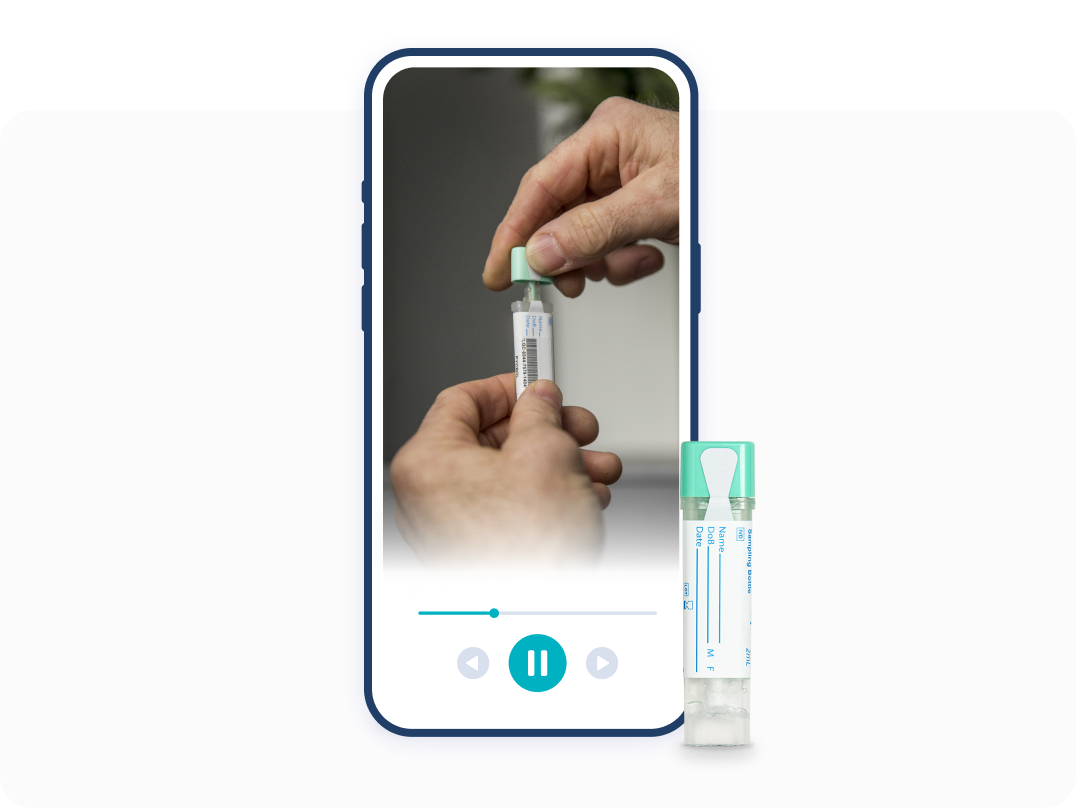
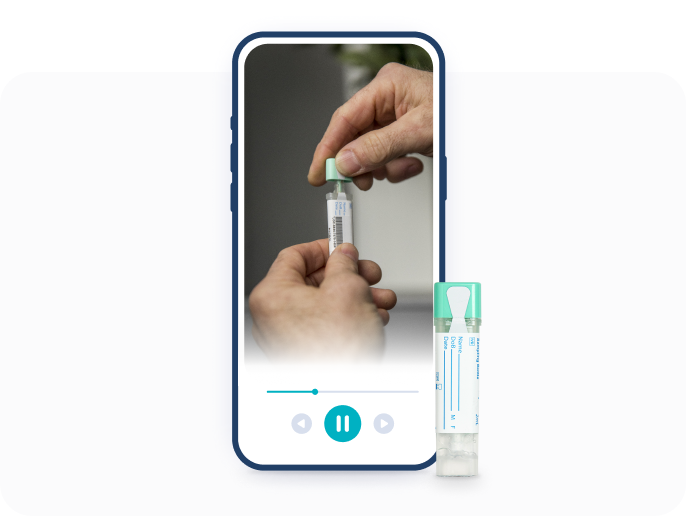
Easy sample collection
Collect your sample from the privacy of home and return using the prepaid shipping label
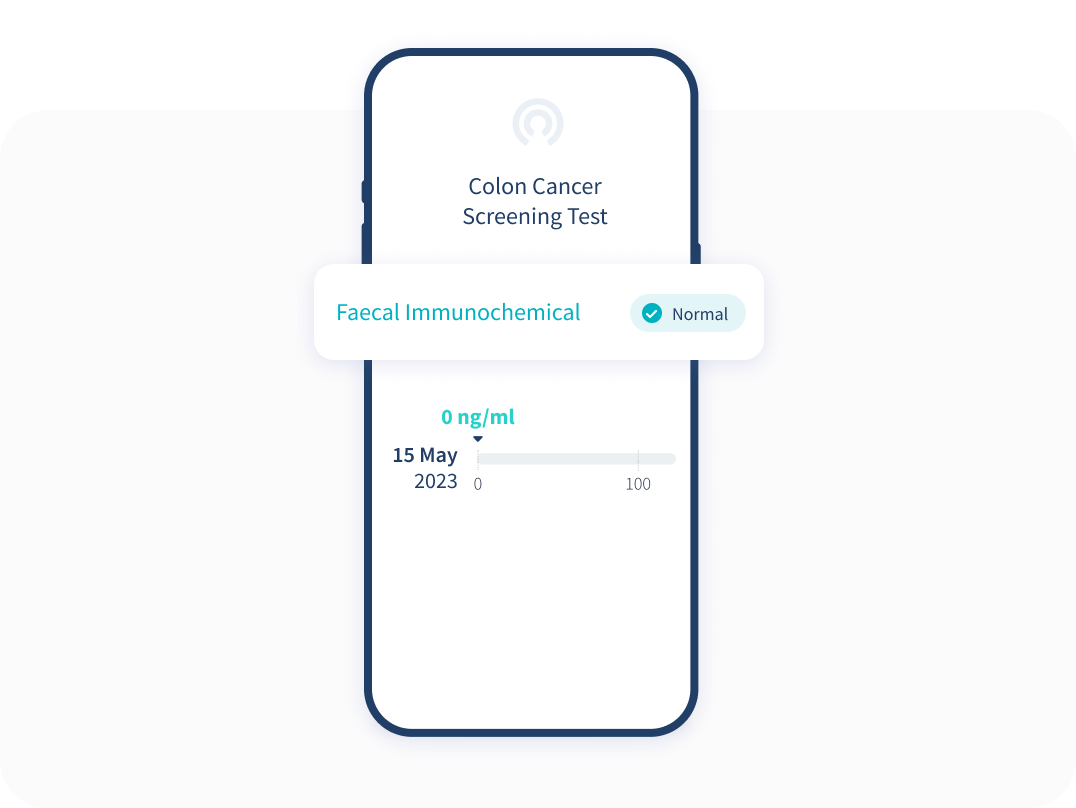
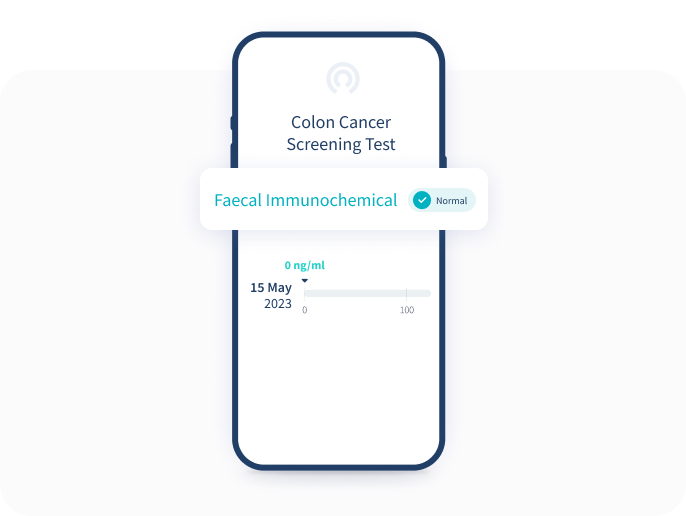
Review results
Your easy to understand results will be available through your online dashboard in 2-5 days


Get medical support
Additional 1-1 support from our clinical team may be provided to discuss your results


How does a FIT test compare to a colonoscopy?
These tests are very different in nature, but both play a vital role. A FIT test is a non-invasive stool analysis that looks for blood. It is an important step in screening for colon cancer and can be done from the privacy of your home.
A colonoscopy is carried out by a specialist physician and involves inserting a camera into your colon. During this test, the doctor can find and remove most polyps and some cancers. They can also take samples, called biopsies, which are then sent to a lab for further testing.
30% of eligible adults are not up to date with their screenings
We know that, with busy lifestyles, making time for appointments can become a chore. That's why we created a screening test that's easy to do from home so that you can keep your health your top priority without sacrificing your schedule.
Source: Richardson LC, King JB, Thomas CC, Richards TB, Dowling NF, Coleman King S. Adults Who Have Never Been Screened for Colorectal Cancer, Behavioral Risk Factor Surveillance System, 2012 and 2020. Prev Chronic Dis 2022;19:220001
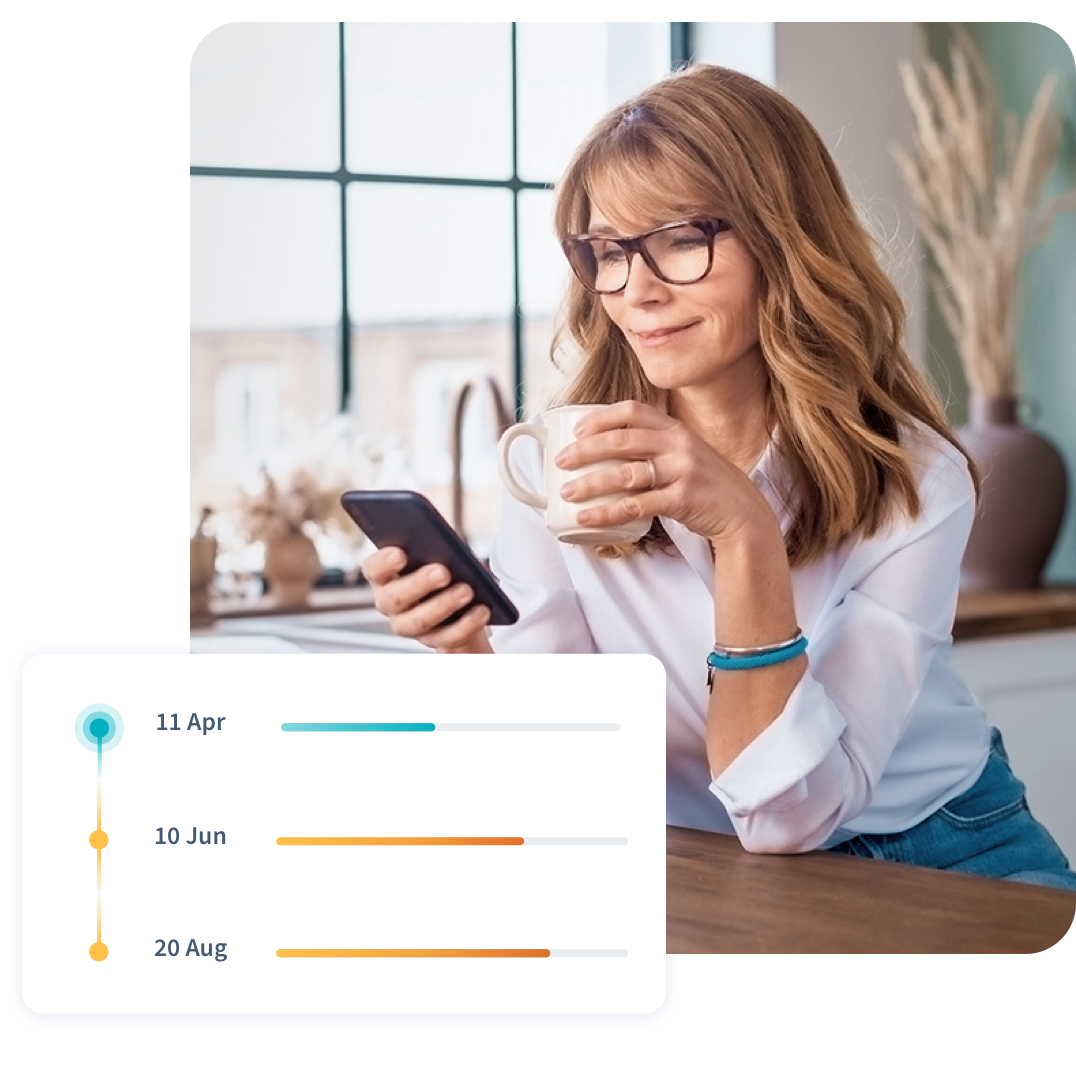
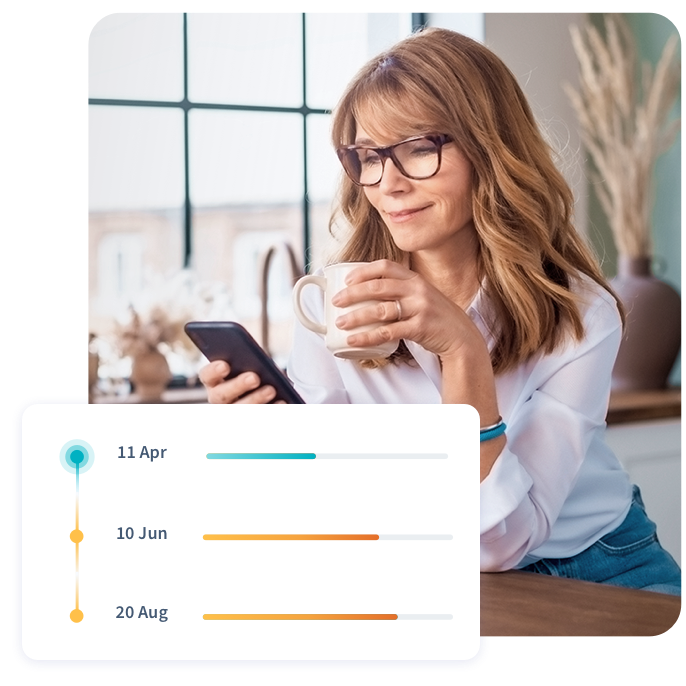
A team you can trust
Meet your dedicated, at-home clinical team. Our team of 30+ experts is here to help guide you on your health journey.

Dr. Robert Mordkin
Chief Medical Officer

Kristin O'Connor
Nurse Manager

Jennifer Reichert
Clinical Pharmacist

Rick Aguayo
Nurse Practitioner

Tiffany Liles
Nurse Practitioner
Still have questions?
Here are some questions we usually get about LetsGetChecked. If you would like yours answered, please contact us ›
The most suitable screening test depends on a few different things - your own medical history, your family history, and whether you have any symptoms that are concerning for colon cancer.
Talk to your healthcare provider about the best screening test for you, when you should start screening, and how often you should be tested.
The fecal immunochemical test (FIT)is a screening test that detects blood in the stool, including blood that is invisible to the naked eye. It is not suitable if you are experiencing symptoms It is used as a screening test for colon cancer because precancerous polyps and cancerous growths may cause bleeding in the colon. There are other conditions that may also cause bleeding, including hemorrhoids, inflammatory bowel disease, and stomach ulcers. Because of this, FIT is not a diagnostic test - it cannot tell whether you have cancer or not. It can only detect whether there is blood in the stool. A positive FIT needs to be followed up with your healthcare provider, usually with a colonoscopy.
A colonoscopy involves looking at the inside of the colon and rectum using a camera on a long, flexible tube that is inserted into the rectum. Colonoscopy is considered to be the best test for colon cancer because not only does it allow abnormal growths or lesions to be seen, but it also allows samples (biopsies) to be taken of these lesions so that a diagnosis can be reached.
This test looks for blood in the stool which can occur for many reasons.
If you receive a positive test result, this means that blood was found in your stool sample and that you will need to follow up with your healthcare provider for further testing such as a colonoscopy. This FIT test alone cannot diagnose colon cancer.
If you receive a negative test result, this means that blood was not found in your stool at the time of testing. However, it’s important to note that there is a small chance that someone with colon cancer could still receive a negative test result. This is called a false negative. It’s very important to consult with a healthcare provider if you are experiencing any symptoms or if you have any concerns, regardless of your test result.
The U.S. Preventive Services Task Force recommends that adults aged 45 to 75, of average risk, should be screened for colorectal cancer. The decision to be screened between ages 76 and 85 should be made on an individual basis. If you are older than 75, talk to your doctor about screening.
Starting screening from a younger age is often recommended if your risk is higher. If you think you may be at a higher risk for colorectal cancer based on your personal or family history, talk to your healthcare provider about when to start screening, what screening test is right for you, and how often you should be tested.
For this test a small stool sample is required. This is a non-invasive sample collection that can be done from home.
Activating the test connects you to the unique alphanumeric barcode within your LetsGetChecked sample collection kit. The laboratory cannot process your sample if the test is not activated and linked to you. You should only activate your test when you are ready to take your sample.
Yes. LetsGetChecked has a team of board-certified physicians who will review your order and results and have created detailed result breakdowns for your testing journey.
Our clinical team is on standby throughout the testing process and, if your test results are abnormal, you may receive a call to discuss your results and next steps.
Please ensure that the sample is collected on a Monday-Friday and returned on the same day using the carrier method provided within the sample collection kit. Each of our health tests includes a prepaid shipping label to return your samples to the laboratory.
Please do not collect or return samples on a Saturday or Sunday.
Keeping your personal data secure is important to us. We use appropriate technical and organizational measures to ensure security and confidentiality of your information, and only share your information where required to deliver our products and services or where we have a legal basis to do so. All samples are disposed of following analysis.
Your samples are processed in the same labs used by primary care providers, hospitals and government programs.
LetsGetChecked laboratories are CLIA approved and CAP-accredited, which are the highest levels of accreditation.
Sample collection kits are manufactured within our ISO 13485 certified facility, the highest level of accreditation for medical devices.
We don't accept insurance at this time. We work to keep our tests as affordable as possible and our test costs are generally lower than the costs incurred from a trip to a healthcare provider.
We accept many Flexible Spending Accounts (FSA) and Health Savings Accounts (HSA) cards. They can be used in the same way that a debit or credit card would be used at checkout.
This test is only suitable for those aged 45 and older. Starting screening from a younger age is often recommended if your risk is higher. If you think you may be at a higher risk for colon cancer based on your personal or family history, talk to your healthcare provider about when to start screening, what screening test is right for you, and how often you should be tested.
Do not collect your sample when you are bleeding as a result of menstruation (also called a period).
If you notice blood in your stool, this test is not suitable and you should follow up with a healthcare provider immediately.


